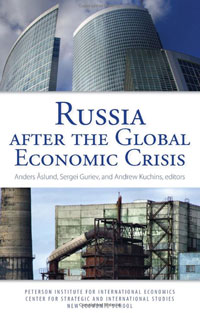Книга: Anders Aslund «Russia After the Global Economic Crisis»

|
The second book from The Russia Balance Sheet Project, a collaboration of two of the world's preeminent research institutions - the Peterson Institute for International Economics and the Center for Strategic and International Studies - examines Russia after the financial crisis of 2007-2009. In the aftermath of the crisis, what is Russia's current economic status and role in the world order? How has the crisis changed a push for an innovation-driven economy fueled by advanced technology growth? Furthermore, how have recent allegations of political corruption affected domestic politics as well as the world's perception of Russia? To answer these questions, the book assesses Russia's international policy challenges and also provides an all-encompassing review of domestic issues. The authors consider foreign policy, Russia and it neighbors, climate change, Russia's role in the world, domestic politics, and corruption. As Russia grapples with the realities of the post-crisis world, this... Издательство: "Peterson Institute for Internal Economics" (2010)
ISBN: 0881324973 Купить за 1209 руб на Озоне |
Anders Åslund
Anders Åslund (pronounced|andəʂ oːslʉnd) (born
He has been a senior fellow at the
Åslund in Sweden
Åslund's political position inclines toward market liberalism and decreased taxation and reduction of social welfare programs and systems, and is therefore regarded as a somewhat controversial economist in Sweden. His main claims regarding the Swedish welfare system are that it in itself generates bureaucracy that causes less redistribution of resources to the citizens most in need of resources, and that the bureaucracy creates an economical crisis by requiring an increased amount of resources in itself. Åslund has suggested that Sweden needs a Russian-style shock therapy.citation needed|date=October 2008
His publications
Åslund is known for his often
In his "Moscow Times" article "Unmasking President Putin's Grandiose Myth" he alleged the enormous wealth of
:In a sensational interview in Germany's "
References
Bibliography
*"Russia's Capitalist Revolution: Why Market Reform Succeeded and Democracy Failed", 2007, ISBN 978-0-88132-409-9, see [http://bookstore.petersoninstitute.org/book-store/4099.html PDF]
*"How Russia Became a Market Economy", 1995, ISBN 978-0815704256
*"Changing the Economic System in Russia", 1993, ISBN 1855671298, with Richard Layard
External links
* [http://www.petersoninstitute.org/publications/author_bio.cfm?author_id=455 Anders Åslund] Biography at the
Источник: Anders Åslund
Другие книги схожей тематики:
| Автор | Книга | Описание | Год | Цена | Тип книги |
|---|---|---|---|---|---|
| Anders Aslund | Russia After the Global Economic Crisis | The second book from The Russia Balance Sheet Project, a collaboration of two of the world's preeminent research institutions - the Peterson Institute for International Economics and the Center for… — Peterson Institute for Internal Economics, Подробнее... | 2010 | 1209 | бумажная книга |
См. также в других словарях:
Global financial crisis of September–October 2008 — The global financial crisis of September–October 2008 is a developing financial crisis which emerged the week of September 14, 2008. Beginning with failures of large financial institutions in the United States, it rapidly evolved into a global… … Wikipedia
Economic history of modern China — For developments before 1911, see Economic history of China (Pre 1911). For economic history since 1949, see Economy of the People s Republic of China. The Lujiazui financial district of Pudong, Shanghai, the financial and commercial hub of… … Wikipedia
ECONOMIC AFFAIRS — THE PRE MANDATE (LATE OTTOMAN) PERIOD Geography and Borders In September 1923 a new political entity was formally recognized by the international community. Palestine, or Ereẓ Israel as Jews have continued to refer to it for 2,000 years,… … Encyclopedia of Judaism
RUSSIA — RUSSIA, former empire in Eastern Europe; from 1918 the Russian Soviet Federative Socialist Republic (R.S.F.S.R.), from 1923 the Union of Soviet Socialist Republics (U.S.S.R.); from 1990 the Russian Federation. Until 1772 ORIGINS The penetration… … Encyclopedia of Judaism
Economic Affairs — ▪ 2006 Introduction In 2005 rising U.S. deficits, tight monetary policies, and higher oil prices triggered by hurricane damage in the Gulf of Mexico were moderating influences on the world economy and on U.S. stock markets, but some other… … Universalium
Russia — /rush euh/, n. 1. Also called Russian Empire. Russian, Rossiya. a former empire in E Europe and N and W Asia: overthrown by the Russian Revolution 1917. Cap.: St. Petersburg (1703 1917). 2. See Union of Soviet Socialist Republics. 3. See Russian… … Universalium
